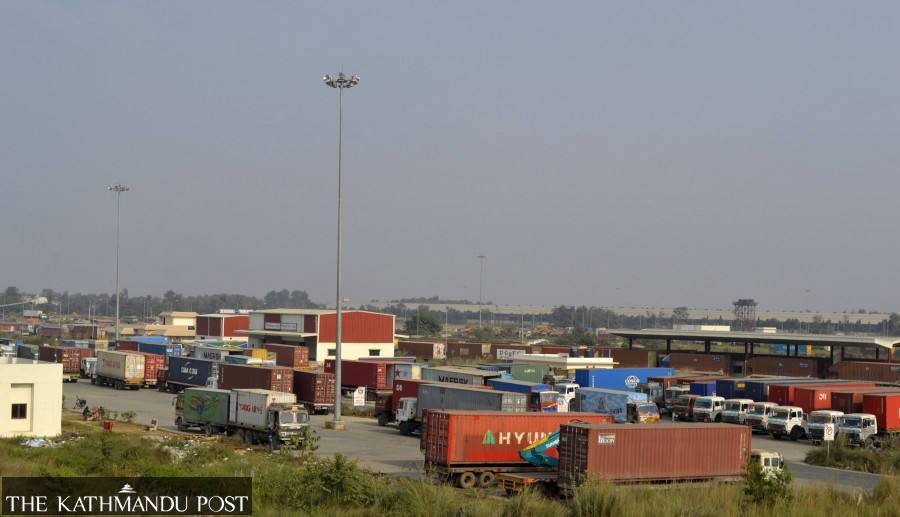Money
Businessmen call for increased security in industrial areas
During the first Covid wave, government had removed Armed Police Force from industrial areas and sent them to borders.
Prithvi Man Shrestha
A group of businessmen from Birgunj has urged Prime Minister Sher Bahadur Deuba to redeploy the Industrial Security Force personnel at Birgunj Pathlaiya Industrial Corridor citing challenges in industrial security caused by emerging threats.
At a press conference organised on Friday in Kathmandu, the businessmen representing the wider business community in Birgunj made public their demands by notifying the Prime Minister, Home Minister, Finance Minister, government secretaries and other senior officials.
In early 2020, the government had removed the permanent presence of Armed Police Force (APF) personnel deployed under the Industry and Revenue Security Force from several industrial areas. The personnel were redirected towards the bordering areas for security following concerns of the spread of the coronavirus in the border areas and across the country.
During the subsequent lockdowns on the heels of the first wave of the pandemic, a majority of industrial firms had downed their shutters. The non-operation of these firms prompted the removal of APF personnel from the industrial corridor.
Beginning March 2020, the government had imposed an almost four-month-long lockdown to prevent the coronavirus from spreading further.
Subodh Kumar Gupta, president of the Birgunj Chamber of Commerce and Industry reiterated their call for security at the industrial corridor in light of apparent threats to the factories and industrialists from various groups and locals.
“It only takes a couple of workers to disrupt industrial operations,” Gupta said. “Also, several factories have been facing disruptions from locals over environmental concerns.”
In March last year, a group of local residents of Simara in Bara padlocked Jagdamba Steels’ warehouse accusing the factory of causing noise pollution.
There are other industrial firms along the Parsa-Bara Industrial Corridor that have been facing obstruction from locals occasionally.
Around six years ago, local residents of Parwanipur staged a demonstration against Narayani Oil and Trishakti Cement Industry for polluting the environment. Meanwhile, industrialists say environmental concerns have surfaced following the mushrooming of settlements around the industrial corridor and that the area was not supposed to host human settlements when the industrial corridor was set up four decades ago.
Aside from threats of obstruction by locals and sometimes by workers, the industrialists also sense a threat from political parties for donations ahead of the upcoming polls.
The government has announced local elections for May 13 but is yet to announce the provincial and federal elections which should also be held in 2022 as per the constitution.
“The presence of the Industrial Security Force is important to ensure an overall peaceful environment for the factories to operate,” said Gupta. “The APF personnel deployed by the Industrial Security Force unit used to help us receive raw materials from Birgunj dry port in a timely manner averting any unwanted disturbances along the way.”
In September 2012, the government had decided to establish Industry and Revenue Security Force (IRSF) to provide security to industrial firms and to curb tax evasion at border points. It was designed to provide security, particularly to the firms in the industrial zones.
The decision was taken after a rise in kidnappings, killings, threats, and extortion of industrialists and businessmen by armed gangs in the post-conflict period.
Back then, militant labour organisations also posed a threat to the smooth operation of factories and industrial firms.
Besides providing security to the industrial firms, Industrial Security Force units had also been helping the Department of Revenue Investigation to control cross-border smuggling and revenue leakages.
“There are now only temporary security units of the APF and they are deployed for industrial security as and when needed,” said Acting Senior Superintendent Kamal Prasad Tiusina of APF, who is also the spokesperson of the paramilitary police force.
“Earlier, there were permanent units with a higher number of security personnel in about a dozen industrial areas including in Itahari, Parsa, Rupandehi, Nepalgunj, Kathmandu, Bhaktapur and Lalitpur, Pokhara among others,” he said.
Tiusina said permanent units of the Industrial Security Force were removed from industrial areas as the government prioritised border security amid the relatively peaceful environment in the industrial areas.
According to Tiusina, officials at both APF and the Home Ministry are aware of the demand from the business community for the restoration of permanent units in the industrial areas.
But the government is facing human resource crunch to deploy APF personnel to industrial areas because of the growing number of border outposts, officials said.
Over the last three years, the government has been increasing the number of border outposts.
According to Tiusina, there are currently 227 border outposts—220 in areas bordering India and seven in areas bordering China. “We have planned to increase the number of border outposts to 500,” he said.
Until 2017, there were only 87 border outposts, according to APF.
“We recognise the need to restore permanent security units of the Industrial Security Force in the industrial areas,” said Phanindramani Pokharel, spokesperson at Ministry of Home Affairs. “But it is difficult to do so immediately because we have to deploy more AFP personnel for election security during the upcoming elections.”
He said that currently industrial firms are not facing major threats from outside elements such as armed groups. “There may be internal disputes leading to the closure of some factories. We will be able to handle such disputes under the existing arrangement,” Pokharel said.




 8.54°C Kathmandu
8.54°C Kathmandu














